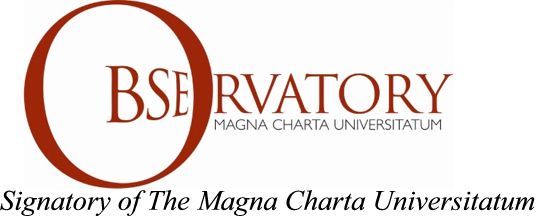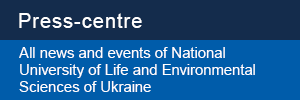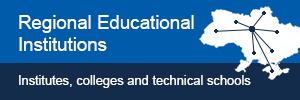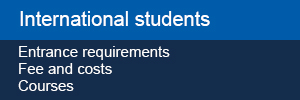Agroportal.ua. Rector of NUBiP of Ukraine Vadym Tkachuk: university is successful when everyone works equally hard – from student to rector
Agroportal.ua. Rector of NUBiP of Ukraine Vadym Tkachuk: university is successful when everyone works equally hard – from student to rector
July 30, 2025
The National University of Life and Environmental Sciences of Ukraine is a leader in training specialists for the agricultural sector. And not only for Ukrainian: many former students of NUBiP work abroad, which confirms the high quality of education and the rating of the educational institution.
For today in NUBiP almost 300 subjects are taught in English at the student's choice. And soon, in cooperation with the Diplomatic Academy and international partners, they plan to introduce a training program for agricultural attaches. Future specialists will understand what is happening in the agricultural business and agriculture at the global level, work in diplomatic missions and promote the interests of Ukraine abroad.
About future academic programs, further development of the University, the current entrance campaign, in general, about the challenges that higher education in Ukraine has today, AgroPortal.ua was talking to the rector of the National University of Life and Environmental Sciences of Ukraine Vadym TKACHUK.
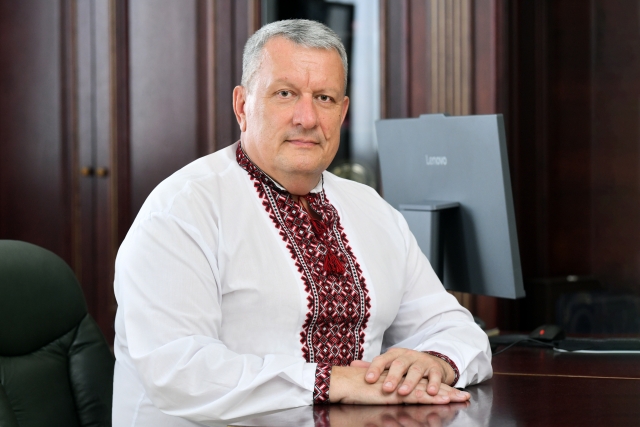
Vadym Anatoliyovych, despite all the challenges, the university annually accepts thousands of applicants. The 2025 entry campaign is already at the finish line. What features of this year's entry would you highlight? How does it differ from previous years — from the point of view of both students and higher education institutions?
Vadym TKACHUK: At NUBiP of Ukraine, as throughout the country, the process of submitting applications for admission officially began on July 19. The admissions committee works directly with applicants, with their personal offices, with applications. But now it is too early to draw conclusions, because the number of applications does not mean the number of students, because today every applicant has the right to choose several universities, educational programs, determine priorities, the form of education, and so on. The most important indicator is how many applications have been submitted to us with the first priority. On the fourth day of applying, we had about 900 applications with the first priority. This is a normal indicator and it is slightly higher compared to last year. But this does not mean that we have a uniform receipt of applications. It is necessary to look, again, in the context of educational programs and faculties, since some faculties have received more applications from applicants, and some — less.
Therefore, we are now monitoring this data and actively working with all applicants to pay maximum attention to each of them. Many of the applicants today are still undecided, we help, advise, suggest, and focus on those educational programs that are most suitable and meet the call of these young people.
Therefore, the work is in full swing, and indeed, now is a very important period for all universities, not just for us. About a hundred people, as well as faculties, deans, and vice-rectors, are permanently involved in the NUBiP admissions committee. In other words, the entire university team is actively working on the entrance campaign.
As for the features of the current entrance campaign, something has already been highlighted in comparison with last year, are there any differences?
Vadym TKACHUK: The features are already known, as they are formed according to the method of passing the NMT, changes in the admission rules, and reforms of the educational policy that exists in the state today. Therefore, we are aware that the changes that preceded the start of the entrance campaign had a certain impact. For example, an indicative cost price was introduced for a number of specialties, that is, when the cost of training or educational services should not be less than the state established. This caused a certain discussion in the educational environment, because the increase in the cost of education in war conditions, when incomes of the population do not grow, when social standards are frozen, wages do not increase, is an additional burden for the applicant, for his/her family.
The second problem is the demographic situation. The population of Ukraine is decreasing, there are challenges related to the war, there are many displaced persons, many Ukrainians are abroad — mothers with children, in particular, of the age that falls on the period of admission to higher education institutions. Nevertheless, we worked systematically all year, conducted career guidance and image work, worked with our focus groups, where we saw our potential, where we have the largest number of applicants. In the NUBiP of Ukraine, the structure of applicants more than 50% — this is Kyiv, the Kyiv region, plus the surrounding regions, although we have students from all regions of Ukraine.
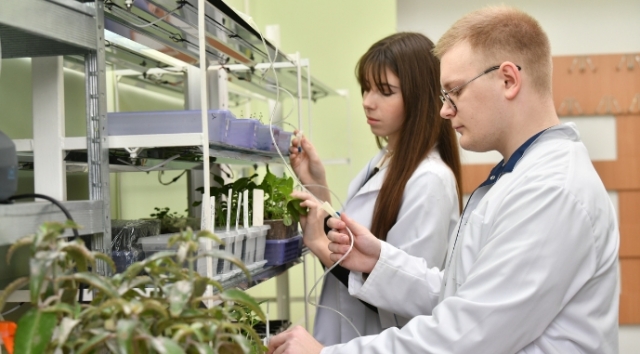
This year, many people are discussing the issue of state order volumes. How has this changed for NUBiP? What should be the ideal approach of the state to forming an order for agricultural universities in the context of the post-war reconstruction of the country?
Vadym TKACHUK: We have a fairly large volume of state orders compared to other higher education institutions — within 1,300 people. Almost all major agricultural specialties have a sufficient volume of state orders, but at the same time, during the last period, we have been entering into a discussion with the ministry and the government as a whole about how the state order should be formed. After all, it must meet the needs of the state economy, that is, how many specialists will be required for certain industries. There is an appropriate rotation of personnel, the number of staff, the professional structure of personnel, and priorities in the development of industries. For example, if we set a priority in the development of the agricultural sector, or the development of the defense industry, or the development of IT or artificial intelligence, then the state should determine these priorities and regulate the volume of state orders. But here, too, you cannot limit yourself to an agronomist or programmer — as a rule, the industry is served by specialists of both humanitarian and economic profiles.
Today, it cannot be said that the state order meets 100% of the needs, since, for example, I have not seen any forecast regarding the personnel support of the economy for the future, and how this was taken into account in the distribution of state orders. Although the Ministry of education and science declares and determines priorities. Indeed, I would like to hear and feel more about who is needed and not who is not needed in the state order.
Regarding the structure of the state order, the ministry in its strategy and long — term plans determines that the state order should be 30-40% of the total number of students, another 30% — should study with the help of grant support and the rest — at their own expense. Therefore, we also understand that it is necessary to take into account the industry feature, since NUBiP is not a 100% Agricultural University. After all, along with traditionally agricultural specialties, information technologies, law, business, energy, and socio-psychological areas are also developing, which is important in the post-war reconstruction. Although we focus on these specialties, in the end, on the agricultural sector, on the agricultural business. That is, if we are talking about law, then this discipline is aimed at regulating land relations and ecology. Similarly, if we are talking about it, it is also not traditional, as in polytechnics. This is it, where they teach the use of information technology tools in agribusiness.
We are building our policy and strategy for the development of the university as a whole on a combination of such industry and classical technologies. We hope that we will have sufficient recruitment for our key faculties and specialties.
However, there is a risk of a shortage for those specialties where tuition fees are increased — the state indicative cost price is set. We understand that there is a problem here that the state regulates the cost of education only for state-owned universities, and private institutions can regulate this independently. There will be unfair competition between universities and a certain barrier for people who really do not have income and the opportunity to pay for training, which will cost more, even despite the quality of education. Accordingly, applicants will choose where it is cheaper. Unfortunately, there may be such a trend.
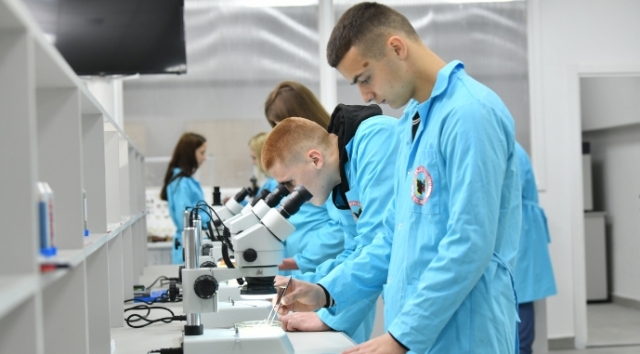
Has the applicant's "portrait" changed — his/her motivation, requests, and orientation? Which specialties are in high demand and which are in lower demand?
Vadym TKACHUK: We constantly conduct a dialogue with our future applicants, introduce them to our educational programs, and try to orient them in life. Because secondary schools, like Ukrainian society as a whole, have been living in conditions of restrictions for almost the last six years. All this affects children, even disorienting them in a certain way in terms of their vision of the future and choice of profession. That's why we try to do this in the career guidance process.
If we talk about the "portrait" of the applicant himself, there are many demanding children, many applicants who already know what they want in life, but at the same time there are many who need a hint, focusing on the advice of elders or recommendations of parents.
For example, when I teach at a faculty, I can also do some analysis of how students have changed over the past 20 years. You know, the "portrait" of an applicant himself, of course, depends on the environment, on the situation in the environment where he/she studied and grew up. Information technologies and social media have a great influence on the formation of personality and world-view. To be honest, not always in a positive direction. Why? Because some people mistakenly think that artificial intelligence can replace the intelligence of the whole of humanity, that there is no need to learn, that today you can ask a question to Google or GPT chat and get an answer to everything.
But education, in my opinion, is not about how to properly use what has already been developed in databases or artificial intelligence. Education is about learning to think critically, make quick decisions, and accumulate a wealth of knowledge, skills, and experience that will allow you to make quick decisions in real-world conditions. And this will determine, perhaps, the future and future qualifications and success of a particular graduate of a higher education institution, a specialist in general. Because it is wrong to constantly use some databases to make decisions. After all, a person, in addition to knowledge, must also have many skills: leadership, critical thinking, sociability, the ability to quickly adapt to changes.
In the future, changes in new generations will occur even faster than now. We are already seeing them-how the education sector, the economy, and our entire life have completely changed. You need to predict all this and be able to use it, use it for your career ambitions and expectations, in particular for development.
Do you observe that these changes have affected the demand for the most popular specialties?
Vadym TKACHUK: I can also analyze this in dynamics. If earlier we considered economics, law, and management prestigious, now more technological specialties are a priority. In NUBiP of Ukraine today, we almost fully use the entire license for training personnel, for example, in agronomy, veterinary medicine, forestry, biotechnology, agroengineering, construction, food technologies, computer engineering and other applied specialties.
In recent years, such specialties as management, logistics, marketing, psychology, and social work have also shown a growing trend. Therefore, it is difficult to talk about prestige here, it seems to me that this is a far-fetched category. It is important to think and consider where you can realize yourself in the future. Unfortunately, applicants do not always see this and do not always consciously choose a specialty. But the education sector today is adapting very quickly in the process of its reform and development. We are talking about multidisciplinary programs when we train a specialist at once, combining several professions — for example, an agronomist and an IT specialist.
Today, agronomy has technologies such as remote sensing of the earth, when it is possible to assess the yield, the remaining nutrients in the soil, conduct precision farming, and so on. This requires not only knowledge of technologies for growing a particular crop, but also knowledge from the field of Information technology. And there will be such programs. We are already working on this, creating such opportunities, and in the coming years we will build our strategy on making there more such programs.
In recent years, the university has been actively developing its technological base — digital laboratories, drones, precision farming systems. What is the place of innovation in the new NUBiP strategy?
Vadym TKACHUK: In addition to the above, we are also implementing GIS technologies (geographic information systems), when it is possible to remotely probe crops and woodlands. Recently, together with the ambassador of the Czech Republic, the Educational and Scientific Institute of forestry and park gardening of NUBiP of Ukraine has opened a laboratory for remote monitoring of forests. With the help of the Czech agency for international development and the Institute of forest management of the Czech Republic, we have created a laboratory for 24 jobs, where we would train students and forest industry specialists in remote forest management. With the help of GIS technologies, we can evaluate woodlands, determine their age, breed structure, and many, many other parameters that are necessary to regulate all forest ecosystem management processes.
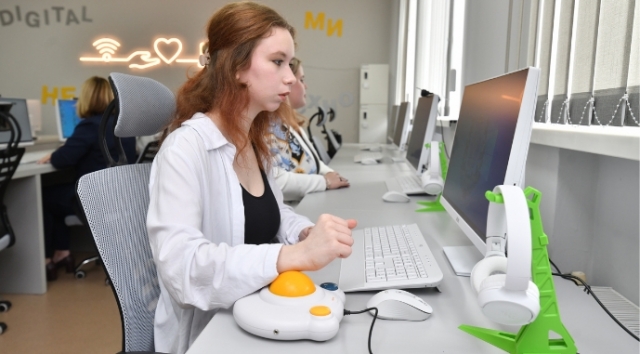
There are also many examples in the field of beekeeping. The smart hive system has been developed, where you can remotely determine how much honey has arrived in a day, and how bees work. We also have a laboratory for growing purebred queen bees and help beekeepers improve their work on breeding bee colonies.
Today we have excellent laboratories in the field of animal husbandry. In veterinary medicine, we can monitor various diseases. With the help of modern technologies, we can monitor livestock directly in their locations on farms, manage certain processes of their maintenance and prevent certain diseases.
In addition, our nutritionists demonstrate high results. NUBiP has launched the first Master's program in Ukraine «Nutrition and public health». It is aimed at improving human health through nutrition. We already have an excellent laboratory base, specialists who are currently developing healthy nutrition programs for schoolchildren, and scientific developments in providing nutrition to soldiers of the Armed Forces of Ukraine.
I will give you another vivid example. The university has a Ukrainian Research Institute of agricultural radiology, which has been monitoring the situation after the Chernobyl disaster for 39 years and conducting scientific research. Among their developments are methods to reduce the impact of radiation and reduce the accumulation of radiation in milk, meat, and plants. The latest experiment of our research group is a certain supplement to mixed feed that is fed to fish, which blocks the accumulation of radioactive elements. These innovations show efficiency, and our experts are in demand in the world today.
One of our priorities is to participate in the state initiative for humanitarian demining Demine Ukraine. The component and scope of responsibility of the NUBiP of Ukraine is not physical demining, removal of explosives from the soil, but the detection of pollutants of military origin in the soil and the development of methods to neutralize the impact of these chemical pollutants on agricultural land. This will allow lands be returned to agricultural use faster. We have such methods, and now we have two projects with the support of FAO and the Ukrainian UKRNTS, which are already being implemented by our Ukrainian laboratory for the quality and safety of agricultural products.
In other words, there are many scientific developments and areas that can be discussed in terms of innovation, and they are all reflected in the cooperation of NUBiP of Ukraine and business.
The university actively cooperates with leading players — from holdings to local farms. What does this cooperation look like in practice: joint projects, research, dual education, mentoring?
Vadym TKACHUK: We have several areas of cooperation with business. The first is educational, when we actively involve businesses in the discussion of educational programs.
NUBiP has a council of employers, which is headed by a well-known farmer, director of the agricultural firm «Kolos» Leonid TSENTYLO. No one knows better than an employer what kind of specialist they need. Therefore, employers express their opinions on each specialty regarding the necessary skills or competencies. We will then adapt this request to our educational programs and discipline curricula.
The second direction is to update the laboratory base in cooperation with business, attracting large companies, in particular technological ones. In this way, we teach students technologies based on modern tools that work in real business. There are 365 such educational, scientific, training-scientific-industrial, and innovative laboratories in all faculties. And we are constantly upgrading them, every year there are dozens of laboratories.
The next one is research. Today, we have high indicators in comparison with other higher education institutions regarding the receipt of funds from various sources for scientific research. Last year's science budget at NUBiP of Ukraine amounted to more than UAH 136 million. Of these, 30% is what we receive in cooperation with business, 30% is grants from international organizations, and the rest is what we receive on a competitive basis from the Ministry of education and science of Ukraine, the National Research Foundation of Ukraine, and so on.
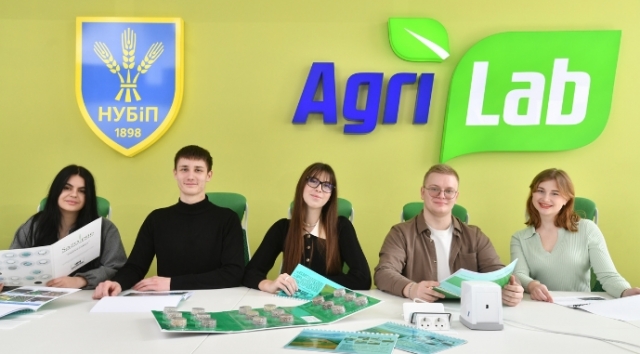
How is the approach to practical training of students changing — in particular, in the context of war and new technological challenges? What should a university look like so that graduates can bring results in real business from day one?
Vadym TKACHUK: Training in laboratories is one thing, but you can't do without practice. Our students are currently undergoing practical training at enterprises in the real sector of the economy. To do this, we cooperate with about two thousand different enterprises. In addition, we have our own educational production base, where students can hone all the theoretical knowledge gained in practice.
One of the most important areas of NUBiP transformation is the creation of an inclusive environment. The University has become the first in Ukraine to open a Digital Laboratory to prepare students to work with people with disabilities and socially vulnerable groups.
How do you see the next steps in the development of an inclusive area in NUBiP?
Vadym TKACHUK: inclusion is a broader concept. We consciously implement state policy and create a barrier-free environment that is accessible to those people, applicants, and participants in the educational process who have certain physical limitations. To do this, at the expense of the educational institution, each academic building was provided with lifts, ramps were installed so that all rooms were accessible. We have equipped common areas and classrooms. The work is carried out as planned, as it requires large financial investments.
We actively cooperate with the state social service in the Digital Laboratory. This laboratory, thanks to a set of specialized tools, makes it possible to train people with certain disabilities. In the future, we plan to expand such laboratories so that more and more people can study and acquire a profession.
Also, in NUBiP of Ukraine we have a specialty «Social work and counseling», where we train specialists who work with people with disabilities and socially vulnerable groups. This year, we have opened the educational program «Practical social psychology», whose graduates will help soldiers and citizens overcome PTSD and the like.
In addition, we provided a non-volatile environment for the educational institution, each building is equipped with a generator. We are building, expanding and improving the digital environment: we are transferring the educational process, management systems, and administration to a digital platform that will include personal offices of instructors and students, automated schedules, and document management. We plan to complete this process by the end of next year.
How do you see agricultural education of the future? What new competencies should a graduate of an agricultural university have in 5-10 years to be competitive not only in Ukraine, but also in Europe and the world?
Vadym TKACHUK: First of all, we focus on development, and my task as rector is to promote such an idea and inspire the team to be at the forefront. In a time of crazy changes, technology and artificial intelligence — in order to keep up with the times, you need to step two steps faster.
If we talk about the agricultural education of the future, it is necessary to take into account the forecast that the agricultural sector will be the locomotive of our state's economy for a long time. The industry will require specialists of a diverse range of training who will have the skills and competencies of interdisciplinary educational programs. The key competencies will be: professional knowledge, foreign language proficiency, information technology plus communication leadership skills.
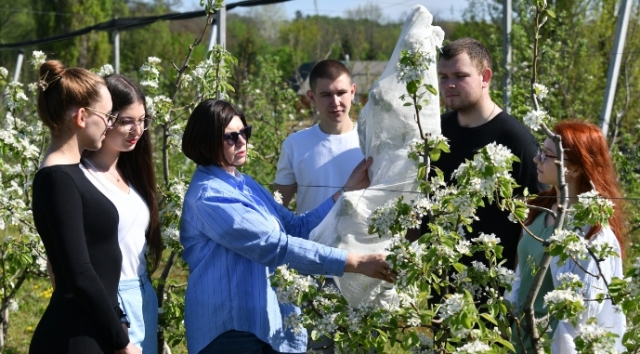
Vadym Anatoliyovych, a year has passed since you headed NUBiP of Ukraine — a university where you worked your way up from student to rector. Your appointment was not only a logical career step, but also a certain completion of your personal educational mission. What priorities and internal benchmarks did you enter the position with? What challenges did you have to overcome this year? What was implemented and what was temporarily postponed?
Vadym TKACHUK: It was a very responsible decision for me to participate in the elections for the post of rector of NUBiP of Ukraine. But I felt that I was ready for this in a certain way, because I worked for 35 years at the University in various positions. That is, I have some experience and understanding of the processes that take place in an educational institution, and I know how to manage all this. Therefore, on the one hand, I was ready, and on the other, I understood what a responsibility it was.
But I want to emphasize that one in the field is not a warrior, and the rector works effectively when there is a professional and friendly team, there is the right idea, a strategy has been developed, connections have been built, and procedures for delegating authority, managing and organizing work have been worked out. Therefore, I always think about how to direct our forces to achieve the goals that we set for ourselves. NUBiP of Ukraine has a development program, which we are completing this year and will develop a new one until 2030. We want to remain a leader in the field of higher agricultural education in Ukraine and continue to actively position ourselves in international cooperation.
Education is not only about training a specialist, but also about being responsible for those who teach. We must think about human capital, how not to lose specialists in the maelstrom of reforms and challenges. This is a complex task that I and the team are trying to solve. In general, a successful university will be when everyone works equally hard — from the student to the rector.
Thank you for the conversation and we wish NUBiP of Ukraine prosperity and reaching new heights.
Viktoria POLEVYK,



